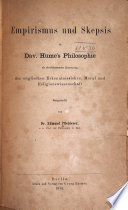 To have the sense of virtue is nothing but to feel a satisfaction of a particular kind from the contemplation of a character. The very feeling constitutes our praise or admiration. We go no farther; nor do we enquire into the cause of the satisfaction. To have the sense of virtue is nothing but to feel a satisfaction of a particular kind from the contemplation of a character. The very feeling constitutes our praise or admiration. We go no farther; nor do we enquire into the cause of the satisfaction.  Mind - Sayfa 421892Tam görünüm Mind - Sayfa 421892Tam görünüm - Bu kitap hakkında
 | David Hume - 1817 - 380 sayfa
...constitutes- our praise or admiration. We go no farther; nor do we inquire into the cause of the satisfaction. We do not infer a character to be virtuous, because...particular manner, we in effect feel that it is virtuous. The case is the same as in our judgments concerning all kinds of ,beauty, and tastes, and sensations.... | |
 | David Hume - 1826 - 592 sayfa
...our praise or admi-> ration. We go no farther; nor do we inquire into the cause of the satisfaction. We do not infer a character to be virtuous, because...particular manner, we in effect feel that it is virtuous. The case is the same as in Our judgments concerning all kinds of beauty, and tastes, and sensations.... | |
 | Jeremy Bentham - 1834 - 340 sayfa
...from ' the contemplation of a character. The very 'feeling constitutes our praise or admiration. ' We do not infer a character to be virtuous ' because...particular manner, we in effect 'feel that it is virtuous. The same is implied in ' our judgments concerning all kinds of beauty, ' and tastes, and sensations... | |
 | Jeremy Bentham - 1834 - 678 sayfa
...from ' the contemplation of a character. The very ' feeling constitutes our praise or admiration. ' We do not infer a character to be virtuous ' because it pleases ; but m feeling that it pleases ' after such a particular manner, we in effect 'feel that it is virtuous.... | |
 | David Hume - 1854 - 572 sayfa
...our praise or admiration. We go no further ; nor do we inquire into the cause of the satisfaction. We do not infer a character to be virtuous, because...particular manner, we in effect feel that it is virtuous. The case is the same as in our judgments concerning all kinds of beauty, VOL. n. 30 and tastes, and... | |
 | Robert Woodward Barnwell - 1859 - 102 sayfa
...our praise or admiration. We go no farther ; nor do we inquire into the cause of the satisfaction. We do not infer a character to be virtuous, because...particular manner, we in effect feel that it is virtuous. The case is the same as in our judgments concerning all kinds of beauty, and tastes, and sensations.... | |
 | David Hume - 1874 - 544 sayfa
...our praise or admiration. We go no farther ; nor do we enquire into the cause of the satisfaction. We do not infer a character to be virtuous, because...a particular manner, we in effect feel that it is virtuous.i The case is the same as in our judgments concerning all kinds of beauty, and tastes, and... | |
 | Edmund Pfleiderer - 1874 - 580 sayfa
...dasselbe; nicht etwa bildet das Gefühl nur den Anlass oder die Basis für einen moralischen Schluss (we do not infer a character to be virtuous because it pleases, sondern das Gefühl seines Gefallens ist, wieder völlig wie in der Aesthetik, identisch mit dem Gefiihl... | |
 | Edmund Pfleiderer - 1874 - 556 sayfa
...dasselbe; nicht etwa bildet das Gefühl nur den Anlass oder die Basis für einen moralischen Schluss (we do not infer a character to be virtuous because it pleases, sondern das Gefühl seines Gefallens ist, wieder völlig wie in der Dienende Stellung der Vernunft.... | |
 | David Hume - 1882 - 524 sayfa
...our praise or admiration. We go no farther ; nor do we enquire into the cause of the satisfaction. We do not infer a character to be virtuous, because...a particular manner, we in effect feel that it is virtuous.1 The case is the same as in our judgments concerning all kinds of beauty, and tastes, and... | |
| |